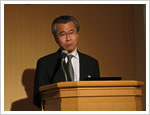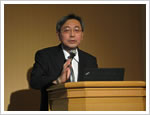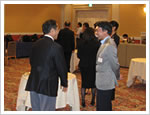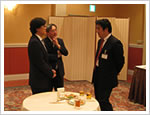第4回講演会「エピジェネティクスの可能性」

- 日程
- 2012年6月15日(金)
- 会場
- 青山ダイヤモンドホール
- 来場者数
- 34名
- メディア掲載
- ・メディカルトリビューン『MT Pro』 2012年6月19日掲載
「エピジェネティクスの応用,治療薬の先にあるもの」
- 講演内容
-
-
特別講演1
「エピジェネティクスの守備範囲」
塩田 邦郎(東京大学大学院農学生命科学研究科
応用動物科学専攻および獣医学専攻 細胞生化学研究室 教授)座長: 斎藤一郎(鶴見大学歯学部病理学講座 教授、同大先制医療研究センター長)
-

どの個体でも他個体と異なるDNA配列を含み、"正常ゲノム"を定義できない状態になってきた。少なくとも"遺伝子の変異が皆無の人間"は世に存在しない。ガンなどゲノム変異が良く研究されている疾患に関わらず、様々な慢性疾患の根底にゲノム異常あるいはゲノム多型がある。また、遺伝子疾患であっても全てが初期胚・胎児期から異常があるわけではなく、誕生後もしくは成人期以降に発症する場合も有り得る。希少疾患や高頻度の慢性疾患の場合も、通常は(i) 発症に至る過程でDNAの変異は起きない、(ii) 症状は長期間(生涯)である、など勘案すれば、発症や症状の悪化は"遺伝子変異には依らない長期間の遺伝子機能の変化"、すなわちエピジェネティクスの変化によると考えられる。ゲノム診断が迅速・安価となり、胎児期あるいは出生時に将来の様々な疾患の予測が可能となる社会は幸せであろうか?"Yes"と言うためには予防と治療が可能となっていなければならない。予防と治療を目指したエピジェネティクス研究を急ぐ必要がある。
-
特別講演2
「胃洗浄廃液を用いた超早期胃癌診断」
伊東 文生(聖マリアンナ医科大学 消化器・肝臓内科 教授)座長: 山下継史(北里大学医学部 外科学講座講師)
-

内視鏡診断技術の発達によりStage I胃癌症例が50%以上を占めるわが国において、内視鏡的治療をはじめとした低侵襲胃がん治療の開発がめざましい。一方で、今後わが国のハイリスク残胃症例に対する適切な検査系の確立が必須であるものの未だ十分ではない。現在、残胃に対して内視鏡医による経験に基づいた診断、スポット生検による病理診断のみである。我々は、残胃を低侵襲かつ効率的よく診断する方法を開発した。すなわち胃洗浄廃液による遺伝子診断である。胃の発癌機構にエピジェネティックな異常が大きく関与することを臨床診断へ応用し、網羅的メチル化解析等により選出した候補遺伝子(MINT25, Sox17, miR34b/c, ACMG1)を分子マーカーとし、胃洗浄廃液により回収された胃粘膜細胞由来のgDNAを用いて癌存在診断、予測診断ができる可能性を予備試験により確認し、前向き多施設共同試験を実施中にある。
- 懇親会
-



-
The 4th symposium "Potentiality of Epigenetics"
- Lecture
-
-
Special lecture 1
"Expanding scope of the field of epigenetics"
Kunio Shiota, Professor, Laboratory of Cellular Biochemistry, Graduate School of Agricultural and Life Sciences/Faculty of Agriculture, The University of Tokyo
Chairman: Ichiro Saito, D.D.S., Ph.D., Chair and Professor, Department of Pathology, Tsurumi University School of Dental Medicine
-

Every individual has specific DNA sequences differentiating him/her from other individuals, and now it has become impossible to define a "normal genome." At least there are no humans "who have absolutely no genetic mutations". Despite the intensive studies on gene mutations in cancers etc., genomic abnormalities and genomic polymorphisms form the basis in the pathogenesis of various chronic diseases. Furthermore, even in cases of genetic disorders, the genetic abnormalities do not necessarily exist from the embryonic or fetal stages, but sometimes develop after birth or even during adulthood. Even for cases of rare diseases or chronic diseases occurring at a high incidence, if we take into consideration that normally, (i) mutation in DNA does not occur during the period until the onset of the disease, (ii) the symptoms last a long time (for a lifetime) etc., it is possible to think the development and/or worsening of diseases may not be caused by genetic mutations, but by "changes in the genetic functions over a long period of time", that is, by epigenetic changes. If genomic diagnosis becomes rapid and cheap, and prediction of diseases becomes possible during the fetal period or at birth, will persons in such a society be happy? To answer "Yes" to this question in the future, prevention and treatments for the predicted disease will have to become available. Thus, there is an urgent need for progress in research in the field of epigenetics, with the objective of finding effective prevention and treatment methods.
-
Special lecture 2
"Early diagnosis of gastric cancer with gastric washes"
Fumio Itoh, Professor, Division of Gastroenterology and Hematology, Department of Internal Medicine, St. Marianna University School of Medicine
Chairman: Keishi Yamashita, Assistant Professor, Department of Surgery, Kitasato University School of Medicine
-

Due to the progress in endoscopic diagnostic techniques, development of minimally invasive treatments for stomach cancer, beginning with endoscopic treatment, has earned an important place in Japan, where cases of stage 1 stomach cancer account for more than 50% of all cases of gastric cancer. In contrast, despite their clinical importance in the future, no satisfactory methods have been established yet for the diagnosis of disease in high-risk remnant stomachs in Japan. For diseases of the remnant stomach, currently, diagnosis is only based on the experience of the endoscopists and on pathological diagnosis by spot biopsy. Under this circumstance, we have developed a minimally invasive method for efficient diagnosis of diseases of the remnant stomach, that is, genetic diagnosis using gastric washes. Based on the fact that epigenetic abnormalities contribute significantly to carcinogenesis in the stomach, we used candidate genes (MINT25, Sox17, miR34b/c, ACMG1) that were selected by integrated analysis of methylation as molecular markers, confirmed the possibility potential, by preliminary tests, of cancer diagnosis and predictive diagnosis using gDNA derived from gastric mucosa cells collected from gastric washes, and are now conducting a prospective multicenter cooperative study.
-







